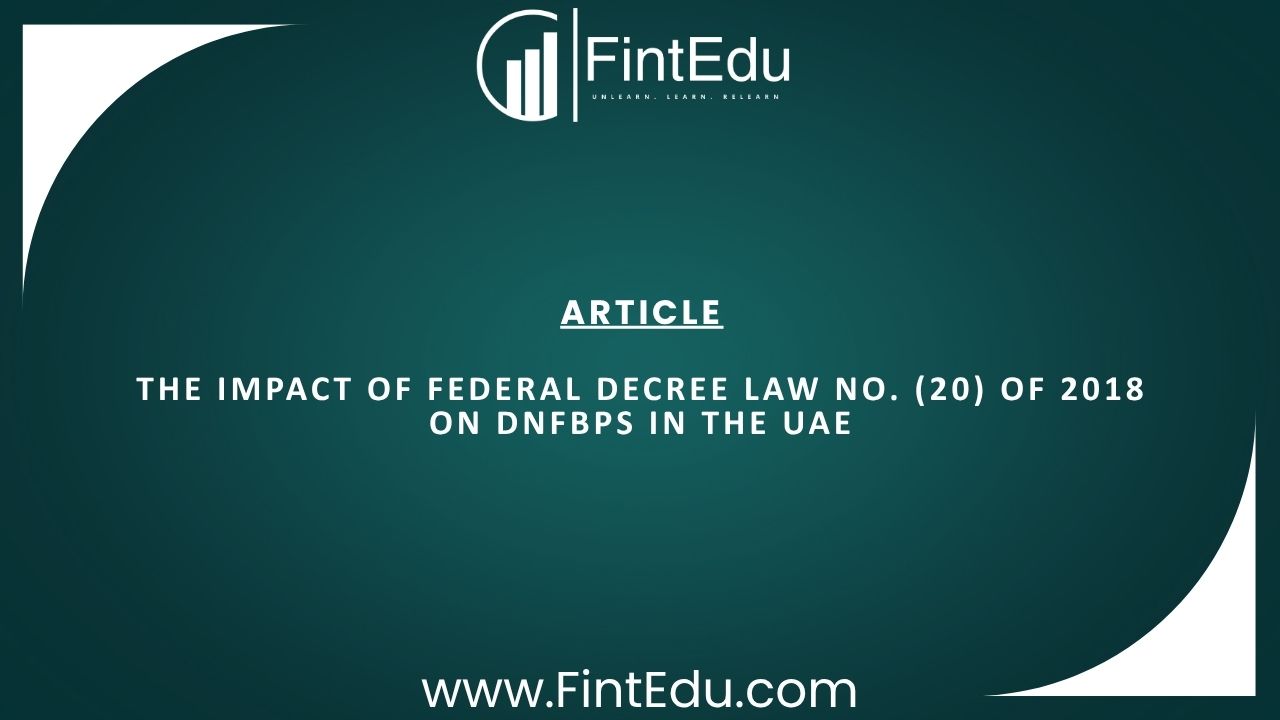Listen to this Article
The Impact of Federal Decree Law No. (20) of 2018 on DNFBPs in the UAE
The regulatory landscape in the UAE has transformed significantly over the past few years, especially in how businesses approach financial transparency and accountability. A key driver of this transformation has been Federal Decree Law No. (20) of 2018, a framework that elevated the standards for Anti-Money Laundering and Combating the Financing of Terrorism (AML/CFT) compliance across multiple sectors including the Designated Non-Financial Businesses and Professions (DNFBPs).
Setting the Tone for Compliance Evolution
Traditionally, the focus of AML measures was directed at banks and financial institutions. However, the UAE’s growing and diverse economy made it clear that non-financial sectors such as real estate companies, accountants, auditors, and corporate service providers also play a crucial role in preventing illicit activities.
The 2018 Decree recognized this and extended the obligation of compliance to these professional service sectors, ensuring a uniform culture of transparency across the economic ecosystem.
From Regulations to Responsibility
For DNFBPs in the UAE, the impact of the decree goes beyond regulatory checklists. It reshaped the business mindset moving from reactive compliance to proactive responsibility.
Entities are now expected to understand not just who their clients are, but why they are engaging in particular transactions. This has created an environment where due diligence, ownership verification, and transaction scrutiny are embedded in everyday workflows rather than being treated as afterthoughts.
Building a Framework of Integrity
One of the most constructive outcomes of the Decree has been the strengthening of internal systems. DNFBPs are now required to:
- Implement Customer Due Diligence (CDD) procedures,
- Maintain detailed records for a defined period,
- Report suspicious activities through formal channels, and
- Ensure beneficial ownership transparency.
These changes have encouraged businesses to modernize many have integrated technology-driven compliance tools, automated data verification systems, and structured internal controls. The shift towards digital compliance has made monitoring not only more efficient but also more reliable.
Elevating Professional Standards
The UAE’s vision of fostering a transparent, trusted business environment is reflected in how DNFBPs are now perceived. Firms that have embraced compliance have seen tangible benefits enhanced credibility, stronger investor confidence, and smoother relationships with financial institutions.
In essence, compliance has become a brand value, not a bureaucratic burden. Businesses that operate ethically and transparently are more resilient, adaptable, and better positioned in an increasingly regulated global market.
The Broader Ripple Effect
Since the enforcement of the 2018 Decree, the UAE has made visible strides in aligning its financial systems with international best practices. This alignment has boosted confidence among global partners and reinforced the country’s position as a secure hub for legitimate business activity.
For DNFBPs, this evolution represents both an obligation and an opportunity: the obligation to maintain robust controls, and the opportunity to differentiate themselves through integrity and trustworthiness.
Looking Forward
As regulatory expectations continue to evolve, DNFBPs in the UAE will need to stay agile—leveraging analytics, automation, and continuous staff training to meet higher compliance standards. The journey that began with Federal Decree Law No. (20) of 2018 has set the foundation for a future where transparency and ethical governance are cornerstones of sustainable success.
References: Federal Decree Law No. (20) of 2018 on Anti-Money Laundering and Combating the Financing of Terrorism (UAE Official Gazette)
Disclaimer: Content posted is for informational and knowledge sharing purposes only, and is not intended to be a substitute for professional advice related to tax, finance or accounting. The view/interpretation of the publisher is based on the available Law, guidelines and information. Each reader should take due professional care before you act after reading the contents of that article/post. No warranty whatsoever is made that any of the articles are accurate and is not intended to provide, and should not be relied on for tax or accounting advice.
Contributor
Related Posts

The Growing Importance of Corporate Service Providers Corporate Service Providers (CSPs) play a key ...
Read More
The UAE has introduced a new top-up tax regime as part of its commitment to global tax reforms und...
Read More
Qatar, 05 January, 2026: The General Tax Authority (GTA) has announced that the tax return f...
Read More